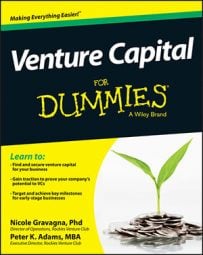A venture capital investment is a partnership between an investor and a growing company. To create a productive relationship that supports a rapidly growing company, the partnership has to be good for both the entrepreneur and the venture capitalist. To ensure that the agreement is fair and promotes the interests of both parties, pay particular attention to the term sheet and to your company's valuation.
Term sheets
A term sheet is a legal document that outlines the agreements made between the investors and the company founders. When both sides agree on the terms in a term sheet, the deal can close, and the investors effectively purchase stock in the company. The term sheet contains multiple terms, but the most negotiated are these:
The type of investment (stock or convertible debt): Convertible debt is a hybrid type of investment. The agreement begins as debt and then converts to a purchase of stock if the money is not paid back. Generally, both sides assume that the debt will convert to stock at an agreed-upon time. A regular stock purchase is a transaction in which an investor purchases a number of shares in a company for a predefined price.
The price of the stock, which is defined by the valuation of the company. Determining the price of stock for a start-up company is not a simple task. Many ways exist to determine a company's value. No matter how much a founder calculates his or her company's valuation, the true price of stock is the price that an investor is actually willing to pay.
Liquidation preferences for investors: Investment agreements are not all created equal. One of the biggest factors that affect an investor's final payout when your company sells is the liquidation preference. The liquidation preference describes who gets paid first when the company is sold. Liquidation can also occur when the company is dying, and assets are sold to cut losses. People holding preferred stock typically get their invested money back before everyone else.
Definitions for who controls the company: Investors can be given voting rights so that they make executive decisions for the company as a group. Also, investors can sit on the board and have a major impact on decision making. Determine up front how much power you want your investors to have.
Valuation
The price of your company's stock is defined by the valuation of the company and the number of stock shares that make up the company.
Risk is a key determiner of your ultimate valuation. The value of your company is low when you first start up, because you face many future milestones that have yet to be accomplished. Over time, you decrease your risk by accomplishing these milestones. As you do so, the value of your company grows — a situation that is reflected in the cost of your company shares. Investors will have to put more dollars into the company to buy the same number of shares.
Because no perfect formula exists to determine the valuation of an early-stage (pre-revenue) company, expect to spend time negotiating with investors to make sure everyone is on the same page about valuation and risk (both the risks your company faces and those it has already overcome) when investments are made.

